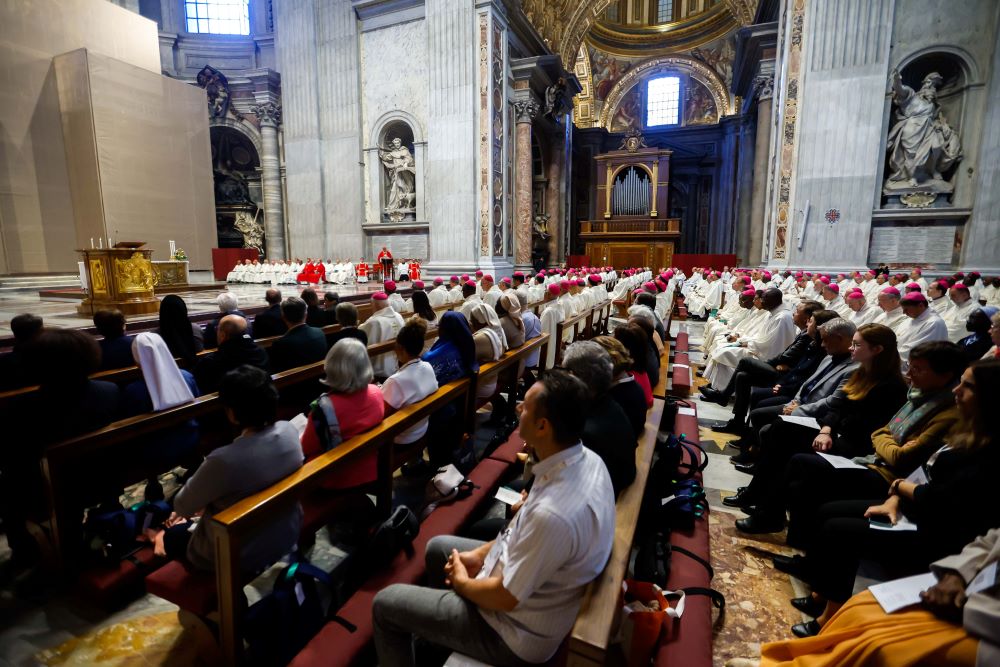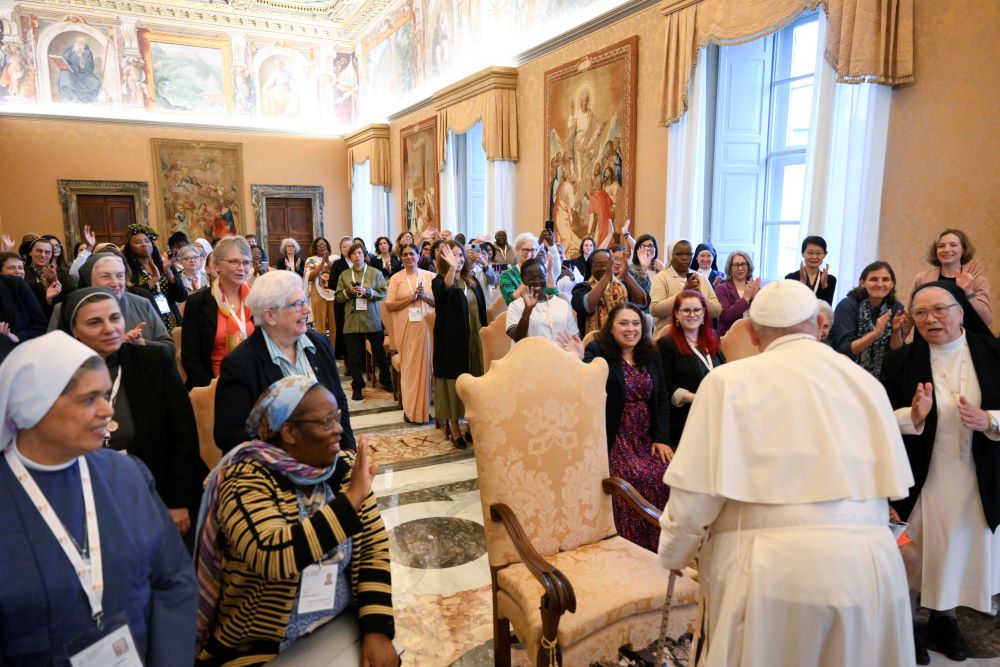
Cardinal Mario Grech, secretary-general of the synod, delivers his homily during Mass with synod participants at the Altar of the Chair in St. Peter’s Basilica at the Vatican, Oct. 21. (CNS/Lola Gomez)
The management of princes was an essential task of statecraft in earlier, monarchical ages. In our more democratic epoch, the essence of governance or leadership is more often the management of expectations.
Pope Francis' synod on synodality, which concluded Oct. 26 with the adoption and promulgation of a 51-page final document, has been stalked by an inability to manage expectations from its start. That failure need not be fatal, but it must be addressed soon and often.
The final document sets forth the purpose of this synodal undertaking: "In simple and concise terms, synodality is a path of spiritual renewal and structural reform that enables the Church to be more participatory and missionary, so that it can walk with every man and woman, radiating the light of Christ". Such a reorientation is the work of a generation or more. It is not a three-year process, but a 30-year one. Our generation must learn how to be synodal and only when we have passed that gift on to another generation will we know if the change has taken root.
You can't turn a large ship on a dime, and the church is a large ship. But the turn has begun. This is no managerial alteration. "Ecclesial discernment is not an organisational technique but rather a spiritual practice grounded in a living faith," the document states.
Two core ecclesiological realities permeate this document. First, the council called for and embodied both ressourcement and aggiornamento, a return to the sources and a bringing up to date. Much of the post-conciliar theological debate has been about which of those two objectives take priority.
The answer is confirmed: Ressourcement allows the church to move forward in new ways, but only if those ways emerge from a lived reflection on the early church, especially as witnessed in the Scriptures. It is a dialogical process of renewal in which the needs of our time are viewed through the lens of tradition, and in which the tradition better attunes us to an authentic appreciation of those instances of grace that we call the signs of the times.
You can't turn a large ship on a dime, and the church is a large ship. But the turn has begun.
Second, that return to the sources opens up a more pluralistic understanding of the church than what was obtained in the pre-Vatican II years. In the early church, the dynamic of pluralism — and of dialogue — was between the churches of the East and the West. Now the dynamic is between the churches of the Global South and the churches of the post-industrialized West. One synod participant told me to reflect on this difference, and another told me the analogy was bosh. Either way, the final text demonstrates that the synodal process can generate a fair amount of consensus, even if certain neuralgic issues are not yet ripe for consensus.
It is unclear whether or not pulling the neuralgic issues off the agenda helped or hurt the development of synodality. In March of this year, the pope announced the creation of 10 study groups to work on particularly challenging topics, including the role of women in the church. One of those groups, group 5, was tasked with studying "some theological and canonical matters regarding specific ministerial forms," including the possibility of ordaining women to the diaconate.
Maybe the pope had his reasons for removing the topic from the discussion. Maybe he was worried that the issue remains fraught and that searching for a premature consensus could derail the entire synodal process. Maybe he is right. But, couldn't he have said at the start of the process three years ago: "If we start with some of the most problematic issues, the whole synodal process risks going astray. We must first focus on the evangelizing mission of the church and then, and only then, turn to specific issues."
Such a statement would have disappointed those who want action and want it now. But at least everyone would know where they stood. Instead, even the Vatican's effort to dialogue with synod participants on the issue turned into a fiasco.
The themes that have marked this papacy all along are present in the vision sketched by the synod: reaching out to the peripheries, learning from the poor, bringing God's mercy to a broken world. Anyone who thought Francis' commitment to the church's social teachings meant he was going to water down other teachings was wrong to expect that. The coherence of the church's teachings may not translate into the culture war categories of the U.S. church, but they are coherent nonetheless.
Advertisement

Pope Francis meets with women participating in or assisting the Synod of Bishops in the Apostolic Palace at the Vatican Oct. 19. (CNS/Vatican Media)
None of this should be permitted to detract from the enormity of what has begun. Now it is time to bring the synodal experience back to the local level. Will priests actually listen more attentively to their pastoral councils? Will the bishops' conference create a standing committee to help the bishops bring synodality to the local churches, as Cardinals Blase Cupich and Robert McElroy discussed in this interview with my colleague Christopher White? Will bishops solicit the opinions of a more varied group of lay Catholics? Will the laity take its responsibility to better understand the task of ecclesial discernment? Will we, all of us, learn how to set aside our own agendas long enough to listen, like Elijah, to the gentle whisper of the Holy Spirit?
A final thought. I always warn people to remember that a document like this pertains to the whole church, not just the church in the U.S. Our myopia can be overwhelming.
Now, however, Catholics in the U.S. are on the eve of a polarizing election. We have an opportunity to witness to the ambient culture a synodal method that allows us within the church to address and, if not overcome, at least ameliorate our points of divergence. The document cites "disenchantment with the functioning of democracy" and "increasing autocratic and dictatorial tendencies" as among the problems facing the world, problems that will be solved by force or by dialogue.
The church is called to be "a sign and sacrament of the unity of the whole human race" (Lumen gentium) and in this moment, U.S. Catholics are called to see in synodality a means by which all Americans can remind themselves that we are "fellow citizens." That must be our hope and our challenge.








